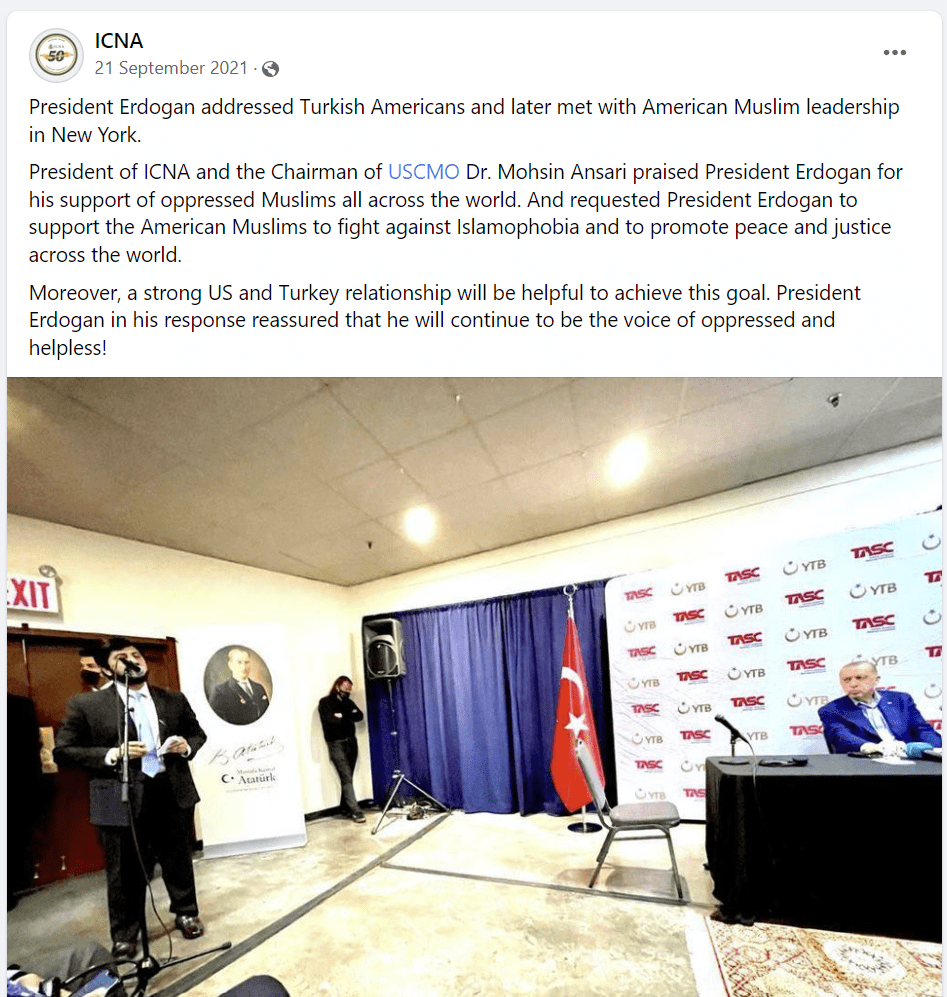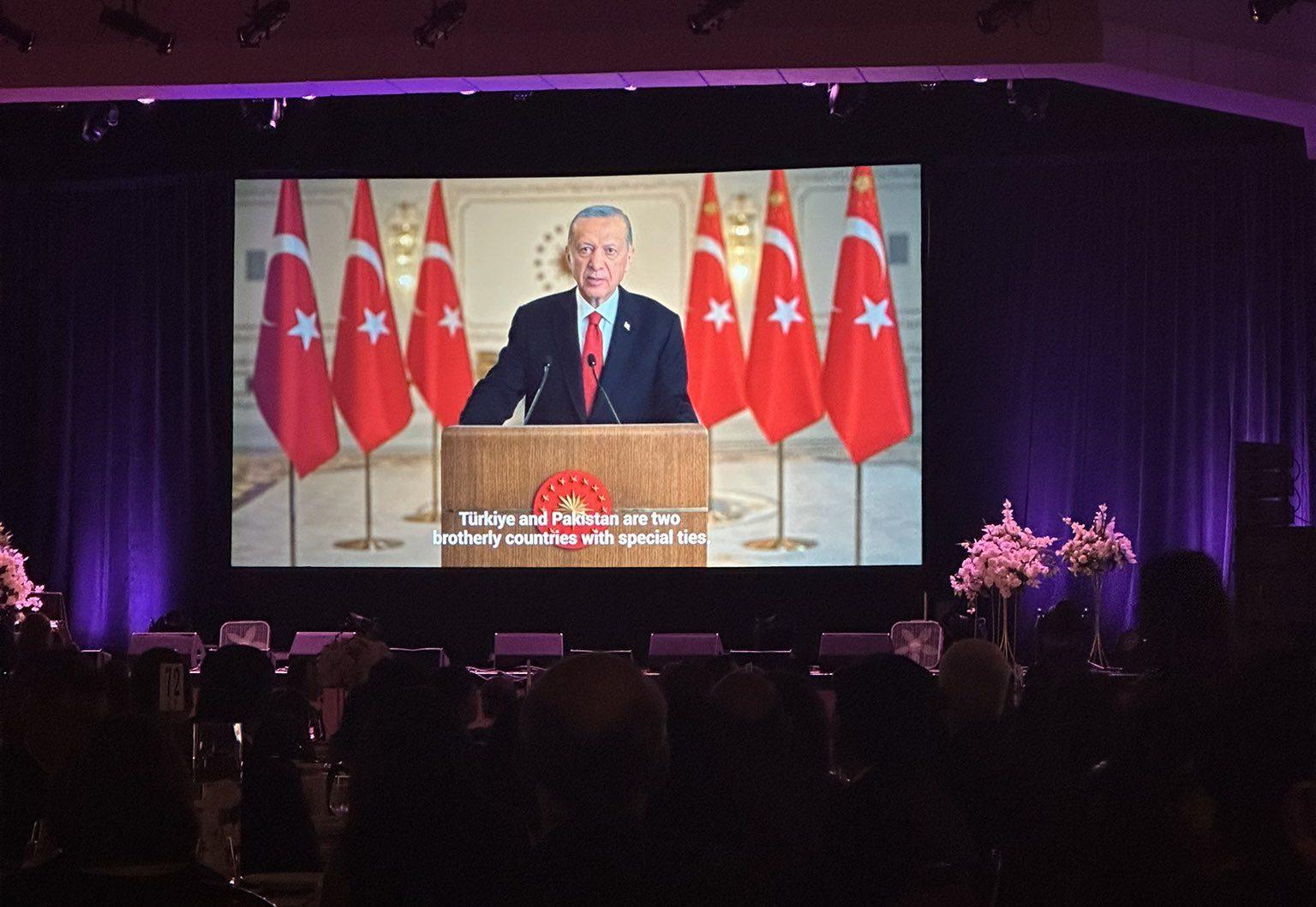In the United States, the Turkish regime is working to coopt South Asian Islamists as proxies for Ankara’s global ideological designs.
In July, Turkish President Recep Tayyip Erdoğan took time out of his busy schedule to address, by video message, the 46th annual convention of the Association of Physicians of Pakistani Descent of North America, or APPNA.
That the leader of an important major power should speak with a seemingly obscure group of American Pakistani doctors might seem puzzling at first glance. But APPNA is no humdrum professional association; it is a key institution of the Pakistani government and its Islamist allies.
Described by former Prime Minister Imran Khan as Pakistan’s “most powerful” lobbyists in the United States, APPNA is also intimately involved with American components of Jamaat-e-Islami, a violent South Asian Islamist movement that controls a substantial proportion of American Muslim institutions.
At the event, Pakistani Ambassador Masood Khan, a terror-tied diplomat closely tied to Jamaat-e-Islami activities in both America and Kashmir, praised APPNA as “the face of Pakistan in the United States,” while also welcoming “Turkish leadership.”
Such a partnership is not totally new. In previous years, Turkish government officials have openly expressed their hope that Jamaat-e-Islami affiliated groups in South Asia will serve as “soft power proxies” for Erdoğan’s AKP government. Just recently, organizations closely affiliated with the Turkish regime have issued statements in support of Jamaat-e-Islami’s leadership in Bangladesh. And in Pakistan, Turkish regime groups and Pakistani Jamaat-e-Islami networks are now working together to manage the education of at least 12,000 students across Pakistan.
Such collaboration extends to the West as well. Ankara has established bodies to coordinate between Western Islamists, Pakistani jihadists and Turkish government officials. As FWI has previously reported, in 2017, one such Turkish regime group, the Union of NGOs in the Islamic World, arranged for multiple British and American Islamist charities, including Jamaat-e-Islami proxies, to meet with the charitable arms of jihadist networks in Pakistan, where they named the U.K, United States and European Union as their mutual “enemies.”
Since then, such collaboration in the West between Pakistani and Turkish Islamists has only continued to develop.
In May 2023, the Turkish embassy boasted that the Islamic Circle of North America (ICNA) had honored Ambassador Murat Mercan with an award at its annual convention. ICNA is, unashamedly, Jamaat-e-Islami’s leading branch in North America.
ICNA leader Mohsin Ansari, who bestowed the honor upon Mercan, welcomed Erdoğan’s election in 2015 by writing that he succeeded in spite of “the liberal anti Muslim media headed by Jews” who “plotted” with the “west and all the possible anti Islam forces” to ensure otherwise.

In July, Ansari was named as a key speaker at an event organized by the Turkish embassy in Washington D.C. to commemorate the “2016 defeated coup attempt in Türkiye,” and to echo various AKP Islamist talking points about the alleged perpetrators.
In August, a “Turkish songwriter” released a jihadist anthem titled “Jails of Kashmir” at an event in Pakistan overseen by Kashmiri radicals, and attended by the “leadership of Jamaat-e-Islami” along with Islamists active in Türkiye, Britain and the United States. The song lionizes Kashmiri jihadists such as Yasin Malik, Shabbir Shah and Asiya Andrabi, whom other Jamaat-e-Islami linked Islamists in America have campaigned for in the past.
Attendees of the event included ICNA-supported Sami Al-Arian, a leading Islamist activist and academic who was convicted by a U.S. court of terror finance charges in 2006. After Arian was deported, he set up shop in Türkiye, under the patronage of the Erdoğan regime.
In September, a delegation of the United States Council of Muslim Organizations (USCMO) travelled to Türkiye, where members met in person with President Erdoğan, along with the head of the Turkish Directorate of Religious Affairs, Ali Erbaş.
ICNA’s Mohsin Ansari previously served as head of USCMO, and leading USCMO member-bodies include Jamaat-e-Islami organizations ICNA and the Muslim Ummah of Norh America (MUNA), which represents the Bangladesh branch of the South Asian Islamist movement.

The Turkish Directorate of Religious Affairs built and manages a major Islamic center in Maryland, named the Diyanet Center of America. In recent months, the Diyanet Center has collaborated closely on separate occasions with ICNA and MUNA, and has invited Mohsin Ansari to speak at the pulpit and offer the Friday sermon.
This significantly expanded level of cooperation between the Turkish regime and South Asian Islamists in the West offers further illustration of Erdoğan’s continued desire to lead disparate Islamist movements around the world. With Jamaat-e-Islami, the Turkish regime has found a willing, subservient proxy.
In contrast, previous efforts by Türkiye to coopt American groups affiliated with fellow Islamist movement the Muslim Brotherhood have produced mixed results, with one Muslim American blog reporting a few years ago that “there’s been a major rift inside” the Islamic Society of North America (ISNA), which was founded by the Muslim Brotherhood, “over the organization selling out its soul to the Turkish government.”
At one point, so exasperated with Turkish overreach, officials within ISNA sought to punish Ankara by embracing the regime’s most notorious enemy, the rival Hizmet movement, which Erdoğan blames for Türkiye’s 2016 “coup.”
Leading American Jamaat-e-Islami operatives, such as the submissive Mohsin Ansari, offer no such resistance to the Turkish regime’s designs.
In his address to Jamaat-e-Islami-linked APPNA, Erdoğan offered Islamist talking points, denouncing the “Islamophobia and xenophobia in western nations” and stressing the “brotherly” relations between Pakistan and Türkiye, before declaring that a united umma of Muslims remains imperative: “All of us, all Muslims, have a great responsibility to ensure that such acts, to which we react very strongly in Türkiye, do not recur. If we act as one heart and one wrist, no one in the world dare to attack the sanctities of Muslims.”
Such Islamist camaraderie is just the latest example of several years of growing Turkish-Pakistani Islamist ties, forged not just in the Islamic institutions and diplomatic channels of the East, but explored through the proxies, fellow travelers and diaspora communities in the West.
These international Islamist machinations indicate not only that the Turkish regime regards American Muslims as important to Ankara’s influence efforts within the United States, but, more importantly, that American Islamism has an important role to play in the development of Erdoğan’s global ideological ambitions.
Sam Westrop is director of Islamist Watch, a project of the Middle East Forum
